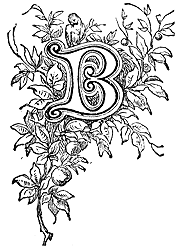 |

ARDEN Tower is within a walk of the priory. The Wharf has to be crossed by means of stepping stones, which are of considerable size for the river rushes past them with great velocity and an awful sound, and sometimes flows over them. The woods beyond, - through which the road to Barden Tower runs, - are extremely lovely. They have sunny glades, and dark and shadowy nooks, and beneath the old trees, on mossy banks, are found (in their season) primroses, blue-bells, foxgloves, and ferns. Every now and then the pedestrian comes on grey cliffs or masses of stone hung with ivy, and overshadowed by trees, while beside the pathway the Wharf pursues its course, sometimes a still and brooding stream, dark in the shadow. then a hurrying torrent, sending the roar of its waters through the woods.
The shattered remains of Barden Tower are shrouded by thick trees and backed by the purple distance of the fells. It was the home of the famous Cliffords, immortalised in history, and by Shakspeare, for their valour and cruelty.
The Clifford, known as the "Bloody Clifford," who murdered young Rutland of York, and afterwards the Duke of York, his Father - a fierce, evil man - was devoted to the House of Lancaster, and died fighting for it on the field of battle at Towton, falling (Shakspeare tells us) by the hand of Richard, Duke of Gloucester, young Rutland's brother.
That battle overthrew the House of Lancaster, and seated Edward IV. on the throne of England. The widowed Lady Clifford, sure that the vengeance of the Yorkists would pursue even the infant son of their feudal enemy, fled with her child into the wildest recesses of Yorkshire and Cumberland. But when Sir Lancelot Threlkeld, a Yorkist knight, married her, she was able to provide better for the safety of little Henry Clifford. He was placed under the care of a shepherd of Sir Lancelot, and remained concealed thus for twenty - four years, tending the sheep of his stepfather.
Whilst watching his flocks by night this noble shepherd boy was won by the beauty of the heavens to watch the stars, and is said by tradition to have thus acquired great practical astronomical knowledge.
On the accession of Henry VII. to the throne he was restored to his hereditary rank and possessions; but he lived retired at Barden Tower, which he enlarged into a dwelling place out of a common keeper's lodge, and there studied, having for his teachers the monks of Bolton. He procured the best astronomical apparatus then to be had, and occupied himself in quiet study during the whole of Henry VII.'s reign, and the first years of his son's. But in 1513, when he was nearly sixty years of age, he was appointed to a command in the army that fought at Flodden Field, and by his conduct in battle showed that he had inherited the warlike genius of his fancily. He survived that field ten years, and is believed to have been buried in Bolton Priory.
Wordsworth has written a most lovely poem on the restoration of the Shepherd lord. We give the following passages from it:
The Lady Anne Clifford, Countess Dowager of Pembroke, Dorset, and Montgomery, is also deserving of notice here, for she was the restorer of Barden Tower, as the singular inscription she placed on it states.
This lady has been justly termed one of the most remarkable of English women.
She had magnificent powers of mind and will, and she used her great capacity and wealth nobly. When she came into her inheritance she found six of her castles in ruins, and the church of Skipton in the same condition. She restored them all; they had been nearly destroyed during the civil wars. Where her beloved mother and herself parted for ever on the highway, she erected a pillar as a memorial of that farewell. She also erected a monument to her tutor Daniel, the poet, and one to Spenser, in Westminster Abbey. She was one of the noblest as well as the most re markable of English women. "She patronised" says her historian, "the poets of her youth and the distressed loyalists of her maturer age; she enabled her aged servants to end their days in ease and independence."
Removing from castle to castle she diffused plenty and happiness around her. Her house was a school for the young, a retreat for the aged, a refuge for the persecuted, a college for the learned. She had the courage to withstand all the arts and actual compulsion of her two husbands to oblige her to change the descent of her inheritance, or to injure the property of her descendants. It is, however, her celebrated letter to Sir Joseph Williamson, the secretary of Charles II., that has immortalised her. He had written to name a candidate that she was to have elected for her borough of Appleby. She replied,-
"I have been bullied by an usurper, I have been neglected by a court, but I will not be dictated to by a subject. Your man shan't stand.
ANNE, DORSET, PEMBROKE, AND MONTGOMERY."
|
 |